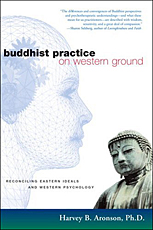Harvey B. Aronson is a psychotherapist in private practice in Houston, Texas, and a Buddhist meditation teacher. He is founder and teacher-in-residence at the Dawn Mountain Tibetan Temple, Community Center, and Research Institute in Houston. In this paperback, he addresses the differences between Asian and Western cultural and spiritual values that often come into play when men and women adopt Buddhist practices. For example, in Korea where social cohesiveness is the norm, disobedient children are sent outside the house as a form of punishment. In the West, the most severe form of punishment is to ground a child — keeping him or her inside. Their culture's emphasis upon individuality makes it quite difficult for Westerners to take to heart Buddhist teachings about no-self or egolessness. Aronson devotes a chapter to this interesting question. He also takes a hard look at the therapeutic view that expressing anger is a positive thing; many Buddhist spiritual teachers would disagree, stating that anger is to be avoided, if at all possible.
Aronson also contrasts the view in the West that attachment is necessary for personal development versus Buddhist teachings that state explicitly that attachment is the source of suffering. Of course, central to these divergences is the emphasis upon individuality in Western culture whereas many Eastern spiritual teachers have experience in communities that emphasize interdependence and connectedness. Aronson provides an interesting overview of these issues and advocates a both/and approach that honors both Buddhist practice and Western psychology.
